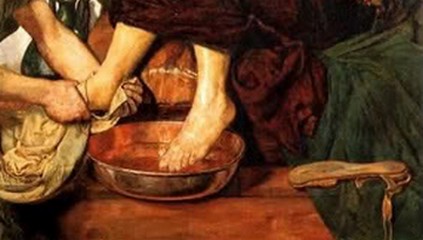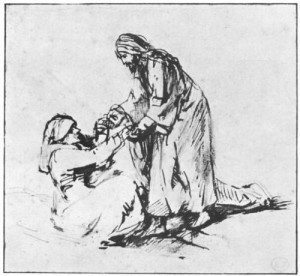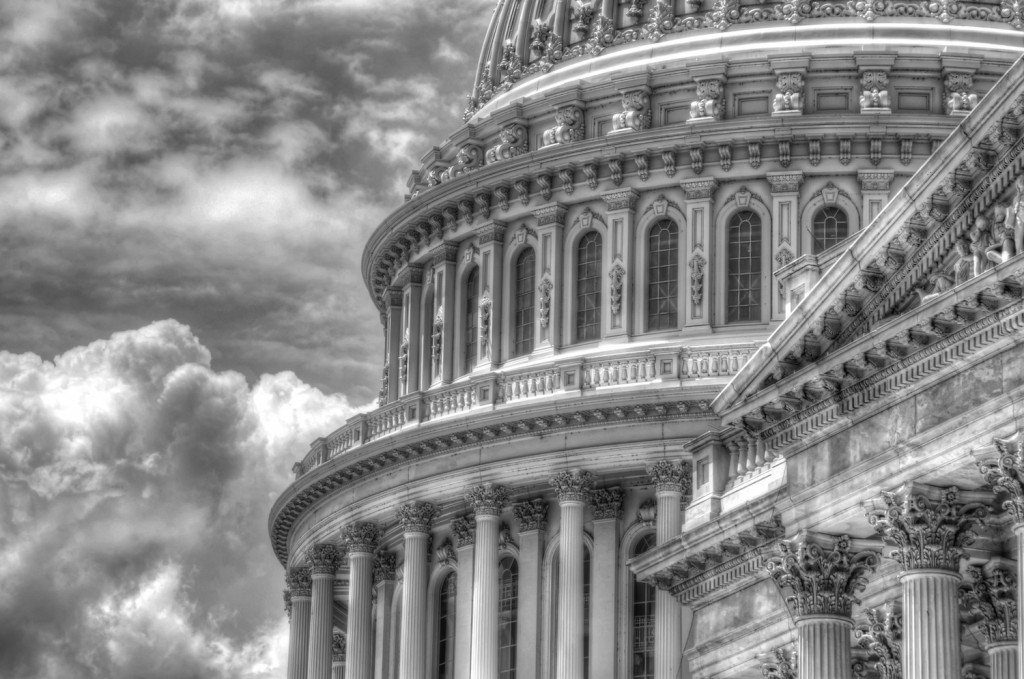====================
On the First Sunday of Advent, Year B, November 30, 2014, this sermon was offered to the people of St. Paul’s Episcopal Church, Medina, Ohio, where Fr. Funston is rector.
(The lessons for the day, RCL Advent 1B, were Isaiah 64:1-9; Psalm 80:1-7, 16-18; 1 Corinthians 1:3-9; and Mark 13:24-37. These lessons can be read at The Lectionary Page.)
====================
 When Philip told Nathanael that he had found the Messiah and that he was the son of a carpenter from Nazareth, Nathanael’s immediate response was, “Can anything good come from Nazareth?” (Jn 1:46). Obviously Nazareth had a reputation, and not a good one. I often wonder if, as Jesus was making his way through the Holy Land, especially early in his ministry when he wasn’t well-known, people would ask him, “What was it like growing up in Nazareth?”
When Philip told Nathanael that he had found the Messiah and that he was the son of a carpenter from Nazareth, Nathanael’s immediate response was, “Can anything good come from Nazareth?” (Jn 1:46). Obviously Nazareth had a reputation, and not a good one. I often wonder if, as Jesus was making his way through the Holy Land, especially early in his ministry when he wasn’t well-known, people would ask him, “What was it like growing up in Nazareth?”
All of my life, whenever I tell my story to folks, they have asked, “What was it like growing up in Las Vegas?” And I have always answered, “Like growing up anywhere else. Las Vegas, when you get off the Strip, was just like anywhere else. It was hometown America.” Las Vegas at the time was smaller than Medina is today; the population of Las Vegas in the early 1950s was only about 25,000 people.
Although there was an airport by then, visitors to Las Vegas usually either drove across the desert or rode the Union Pacific Railroad. The line from Salt Lake City to Los Angeles went through Las Vegas; the railroad ran through town north-to-south and the business and hotel district now know as “the Las Vegas Strip” grew up parallel to, and east of, the tracks.
That’s the side of the tracks I grew up on; on the other side, “the Westside,” was where black people lived. Whites didn’t go there, and Negroes (as black Americans were then politely called) didn’t come to the east side of the tracks except to work, mostly in low paying service jobs as janitors, maids, cooks, porters, and doormen. Yes, indeed, the Las Vegas of my childhood was hometown America. Just like any other town in this country was, and just like many still are. Need I mention the St. Louis metropolitan area and its suburb of Ferguson? Need I mention the Cleveland metroplex and the westside neighborhood near the Cuddell Recreation Center? Need I mention, even, Medina itself?
Yes, I think I need to. A few years ago, our nation elected a black man to be president and many proclaimed that we now lived in a “post-racial” world, that racism is “so yesterday.” Throughout the whole of Barack Obama’s presidency, however, the rhetoric and behavior of many have demonstrated just how wrong that judgment was. We do not live in a “post-racial” society. The shooting deaths of black men and boys, Michael Brown in Ferguson, MO, John Crawford in Beavercreek, OH, and Tamir Rice in Cleveland, OH, all by white police officers, and the choke-hold death of Eric Garner, a black man in the custody of white officers of the New York Police Dept., together with the perceived failures of the justice system and the social unrest which have followed, have demonstrated just how wrong that judgment was. We do not live in a “post-racial” world.
“Keep awake!” said Jesus, “Keep alert!”
Elsewhere, ISIS in Iraq and the Taliban in Afghanistan murder those who differ from themselves, Jewish nationalists in Israel pass laws denying basic human rights to Palestinian Arabs, and Buddhist monks in Myanmar threaten to kill Muslim children, demonstrating just how wrong that judgment continues to be not only in our own country but throughout the world. We do not live in a “post-racial” world. Racism is not “yesterday;” it is today!
“Keep awake!” said Jesus, “Keep alert!”
Meanwhile, epidemics such as the ebola crisis in Africa have caused social upheaval, ethnic conflict, and calls for borders to be closed and walls to be raised between nations. Really quite silly notions about vaccines have led people to refuse them and diseases once thought nearly eradicated are being seen again, such as polio and bubonic plague.
“Keep awake!” said Jesus, “Keep alert!”
Weather extremes are being felt throughout the world and sea levels are rising threatening populations in low-lying areas in the South Pacific Islands, southeast Asia, various parts of Africa and South America, and even in our own country, and these things seem to be the result of our poor stewardship of the earth’s environment. At least, that’s what the great majority of the world’s climate scientists tell us.
“Keep awake!” said Jesus, “Keep alert!”
Jesus said, “Nation will rise against nation, and kingdom against kingdom; there will be earthquakes in various places; there will be famines . . . Brother will betray brother to death, and a father his child, and children will rise against parents and have them put to death . . . There will be suffering, such as has not been from the beginning of the creation . . . [and] after that suffering, the sun will be darkened, and the moon will not give its light, and the stars will be falling from heaven, and the powers in the heavens will be shaken.” (Mk 13:8,12,19,24-25)) Therefore, “Keep awake!” said Jesus, “Keep alert!”
Are we seeing the end-times? Are these things that are happening – the racial and ethnic conflicts, the wars, the epidemics, the weather crises, the floods – are these those fig-tree signs that “when [we] see these things taking place, [we] know that [the Son of Man] is near, at the very gates”? (Mk 8:29) I don’t think so, but who’s to say? As Jesus made quite clear, “about that day or hour no one knows, neither the angels in heaven, nor the Son, but only the Father.” (v. 32)
So I don’t know if these are the signs of the end, but I do know this, that these are the signs of things that displease God. And when God is displeased, watch out! When God is displeased, God “tear[s] open the heavens and . . . the mountains . . . quake at [God’s] presence.” (Is 64:1) It is when God is angry that stars fall from heaven and the powers of the heavens are shaken. We do not want to face an angry God!
And yet we cannot dismiss God’s indignation. We would like to. We would like to focus only on the loving God proclaimed by Jesus, not that angry God that Isaiah and the Psalmist remind us of. We would like to, but we can’t because when we blind ourselves to the potential of God’s anger, we blind ourselves to the things that provoke God’s anger. We fail to see (and thus to deal with) the racism which is endemic our society; we fail to see (and thus to deal with) our poor stewardship of creation; we fail to see (and thus to deal with) the illnesses and diseases which are pandemic among populations less fortunate than ourselves.
I’ll be honest with you. I don’t want to talk about the shooting of Michael Brown in Ferguson, MO, the shooting of John Crawford in Beavercreek, Ohio, the shooting of Tamir Rice in Cleveland, Ohio, or the chokehold death of Eric Garner in New York City. I don’t want to talk about the response of the justice system to those deaths and whether or not it functioned properly in not punishing, in some way, the police officers responsible for those deaths. I don’t want to.
In the same way, I don’t want to remember that when my father’s client and friend Sammy Davis, Jr., came to Las Vegas to perform in the Strip casino showrooms he was not allowed to enter those casinos through the front door but had to come in through the service entrance. I don’t want to remember that when Louis Armstrong and Duke Ellington played in Las Vegas they were not allowed to stay in the hotels that hired them but had to put up at boarding houses on the Westside. I don’t want to remember that when Cab Calloway played at a casino bar in Las Vegas in 1954 he was refused a drink at that same bar during a break in the performance.
I don’t want to talk about or remember these things and, I suspect, neither would most people in this church this morning. Frankly, a large fraction of the white society in which we live would, likewise, prefer that we not do so. We believe that we enjoy the privilege of not talking about, remembering, or doing anything about those things, that those things really don’t affect us, that they really aren’t any of our business. The families of Michael Brown, John Crawford, Tamir Rice, and Eric Garner, and the communities within which they lived, however, do not have that privilege. Black performers who succeeded Davis, Armstrong, Ellington, and Calloway, who now can enter the casino through the front door, stay in the hotel, and drink at the bar, who are the beneficiaries of the groundbreaking they did, do not have that privilege.
And, truth be told, neither do we. If we do not remember and talk about these things, we will have failed to see and deal with the racism, the conflict, the poor stewardship of humankind that is all around us; we will have failed to follow Jesus’ admonition in today’s Gospel to “keep alert” and to “keep awake.” We will have failed to follow the second great commandment to “love our neighbors as ourselves.” We will have failed to heed to word of God recorded in the law of Moses: “You shall not wrong a stranger or oppress him” (Ex 22:21); “The stranger who resides with you shall be to you as the native among you, and you shall love him as yourself” (Lev. 19:34); “You shall not pervert the justice due to [anyone]” (Deut. 24:17). We simply are not allowed to think of or to treat any human being differently from ourselves. We do not have the privilege not to talk about, not to remember, not to do something about the injustices done to others, whatever their race or color, whatever their religion, whatever their sex or sexual orientation.
Nathanael asked Philip, “Can anything good come out of Nazareth?” The world today is asking, “Can anything good come out of Ferguson? Out of Beavercreek? Out of Cleveland? Can anything good come of the shooting deaths of young black men by white police officers?” I pray that it can: we have had enough of the bread of tears; we have had enough of the derision of neighbors; we have had enough of the laughter of scorn. Some good must come from these things and it must start with our realization that we do not have the privilege to stand by and think these things have nothing to do with us.
We do not have the privilege to think of or to treat anyone differently from ourselves. We do not have the privilege not to talk about, not to remember, not to do something about the injustices done to others. If we do that, we fail to keep alert and to keep awake, and we risk the anger of the God who tears open the heavens and makes the mountains quake.
Are the things we are seeing signs of the end-times? No, I don’t think so. Are they signs to which we need to pay attention? Things we need to do something about? Oh, yes! Very much so!
“O Lord, you are our Father; we are the clay, and you are our potter; we are all the work of your hand. Do not be exceedingly angry, O Lord, and do not remember [our] iniquity forever.” (Is 64:8-9) “Restore us, O Lord God of hosts; show the light of your countenance, and we shall be saved.” (Ps. 80:18)
Amen.
====================
A request to my readers: I’m trying to build the readership of this blog and I’d very much appreciate your help in doing so. If you find something here that is of value, please share it with others. If you are on Facebook, “like” the posts on your page so others can see them. If you are following me on Twitter, please “retweet” the notices of these meditations. If you have a blog of your own, please include mine in your links (a favor I will gladly reciprocate). Many thanks!
====================
Father Funston is the rector of St. Paul’s Episcopal Church, Medina, Ohio.
 Every year on Maundy Thursday in the Episcopal Church we do this thing: we gather for Eucharist and we hear these lessons – the story of the Passover from the Book of Exodus, St. Paul’s retelling of the institution narrative of the Eucharist, and St. John’s story of the Last Supper in which he focuses not on the meal but on Jesus’ act of humility and service during the meal (probably quite early in the evening) of washing the feet of the others present.
Every year on Maundy Thursday in the Episcopal Church we do this thing: we gather for Eucharist and we hear these lessons – the story of the Passover from the Book of Exodus, St. Paul’s retelling of the institution narrative of the Eucharist, and St. John’s story of the Last Supper in which he focuses not on the meal but on Jesus’ act of humility and service during the meal (probably quite early in the evening) of washing the feet of the others present. Today is the Third Sunday in Lent but, being March 8, it is also the day set aside on the calendar (both that of the Church of England and that of the Episcopal Church) for us to remember a hero of the Anglican tradition, a World War I chaplain named Geoffrey Anketell Studdert-Kennedy. In 1914 he became the vicar of St. Paul’s, Worcester, UK, but a short while later, on the outbreak of war, Kennedy volunteered as a chaplain to the armed forces. He gained the nickname “Woodbine Willie,” for his practice of giving out Woodbine brand cigarettes to soldiers. In 1917, he won the United Kingdom’s Military Cross for bravery at Messines Ridge.
Today is the Third Sunday in Lent but, being March 8, it is also the day set aside on the calendar (both that of the Church of England and that of the Episcopal Church) for us to remember a hero of the Anglican tradition, a World War I chaplain named Geoffrey Anketell Studdert-Kennedy. In 1914 he became the vicar of St. Paul’s, Worcester, UK, but a short while later, on the outbreak of war, Kennedy volunteered as a chaplain to the armed forces. He gained the nickname “Woodbine Willie,” for his practice of giving out Woodbine brand cigarettes to soldiers. In 1917, he won the United Kingdom’s Military Cross for bravery at Messines Ridge. After I did my first sermon-prep read through of this morning’s gospel I thought, “There are two stories here.” Then I thought, “No, there are three.” And then I realized that there are really more stories here than I can count.
After I did my first sermon-prep read through of this morning’s gospel I thought, “There are two stories here.” Then I thought, “No, there are three.” And then I realized that there are really more stories here than I can count.  When Philip told Nathanael that he had found the Messiah and that he was the son of a carpenter from Nazareth, Nathanael’s immediate response was, “Can anything good come from Nazareth?” (Jn 1:46). Obviously Nazareth had a reputation, and not a good one. I often wonder if, as Jesus was making his way through the Holy Land, especially early in his ministry when he wasn’t well-known, people would ask him, “What was it like growing up in Nazareth?”
When Philip told Nathanael that he had found the Messiah and that he was the son of a carpenter from Nazareth, Nathanael’s immediate response was, “Can anything good come from Nazareth?” (Jn 1:46). Obviously Nazareth had a reputation, and not a good one. I often wonder if, as Jesus was making his way through the Holy Land, especially early in his ministry when he wasn’t well-known, people would ask him, “What was it like growing up in Nazareth?”
 Truth, United States Senator Hiram Johnson observed in 1917, is the first casualty of war. When war becomes nearly universal is truth in danger of being fully obliterated? I don’t think so; I think truth will ultimately survive and prevail. My faith is that the Truth will no doubt prevail, but for the moment, I am speaking neither of grand philosophical concepts nor of the One who made the audacious claim, “I am the Truth.” (Jn 14:6) Rather, I speak simply of factual accuracy and of the intellectual integrity of those who communicate; that truth is suffering some mighty hurtful body blows at present.
Truth, United States Senator Hiram Johnson observed in 1917, is the first casualty of war. When war becomes nearly universal is truth in danger of being fully obliterated? I don’t think so; I think truth will ultimately survive and prevail. My faith is that the Truth will no doubt prevail, but for the moment, I am speaking neither of grand philosophical concepts nor of the One who made the audacious claim, “I am the Truth.” (Jn 14:6) Rather, I speak simply of factual accuracy and of the intellectual integrity of those who communicate; that truth is suffering some mighty hurtful body blows at present. Shechem was known as Sychar in Jesus’ time. Near that land that Abraham had bought for use as a tomb, just a short walk south from the traditional location of Joseph’s tomb, is a well that belonged to Jacob. At that well, Jesus stopped to ask a Samaritan woman for a drink; part of the story of that meeting and Jesus’ conversation with the woman (the longest of all the conversations recorded in the Gospels) is today’s Gospel text (John 4:27-42).
Shechem was known as Sychar in Jesus’ time. Near that land that Abraham had bought for use as a tomb, just a short walk south from the traditional location of Joseph’s tomb, is a well that belonged to Jacob. At that well, Jesus stopped to ask a Samaritan woman for a drink; part of the story of that meeting and Jesus’ conversation with the woman (the longest of all the conversations recorded in the Gospels) is today’s Gospel text (John 4:27-42).  The second tomb is that of Fr. Justinus, the priest who took over the church from St. Philoumenos and continued his work of restoration. An accomplished artist, Fr. Justinus wrote all of the icons which now decorate the nave, sanctuary, and crypt, including an icon of the martyrdom of St. Philoumenos. Fr. Justinus’s tomb is empty because he is still alive. He built his tomb himself and it is placed just outside the front door of the church; he walks past it everyday coming from his residence in the neighboring monastery to the church. It is a daily reminder of his (and our) mortality and of the dangers he (and many) face in the on-going violence or threat of violence that characterizes the Holy Land today.
The second tomb is that of Fr. Justinus, the priest who took over the church from St. Philoumenos and continued his work of restoration. An accomplished artist, Fr. Justinus wrote all of the icons which now decorate the nave, sanctuary, and crypt, including an icon of the martyrdom of St. Philoumenos. Fr. Justinus’s tomb is empty because he is still alive. He built his tomb himself and it is placed just outside the front door of the church; he walks past it everyday coming from his residence in the neighboring monastery to the church. It is a daily reminder of his (and our) mortality and of the dangers he (and many) face in the on-going violence or threat of violence that characterizes the Holy Land today. For the past several days, the Daily Office Lectionary has required us to read sections of the Book of Joshua detailing the conquest of the land “from the Jordan to the Great Sea in the west.” I have dutifully read those lessons every day. I have been deeply troubled by them and by the suggestion (which I have seen some make on Facebook and other online sources) that the “history” set out in the Book of Joshua demonstrates God’s approval of the conquest of “biblical Israel” by the modern state of Israel. I have avoided writing anything about these lessons in these daily reflections on this blog.
For the past several days, the Daily Office Lectionary has required us to read sections of the Book of Joshua detailing the conquest of the land “from the Jordan to the Great Sea in the west.” I have dutifully read those lessons every day. I have been deeply troubled by them and by the suggestion (which I have seen some make on Facebook and other online sources) that the “history” set out in the Book of Joshua demonstrates God’s approval of the conquest of “biblical Israel” by the modern state of Israel. I have avoided writing anything about these lessons in these daily reflections on this blog.

